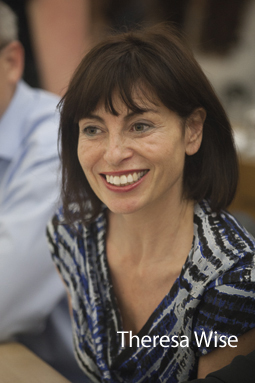 Theresa Wise, chief executive of the RTS, outlines the organisation's plans for growth
Theresa Wise, chief executive of the RTS, outlines the organisation's plans for growth
The Royal Television Society is poised for exciting change. At the heart of the RTS’s plans to broaden the range of its activities and extend its membership is a renewed commitment to education.
The Society wants to build on existing relationships and provide members with some of the help they need to start and sustain a career in today’s digital landscape, where apps and Attenborough co-exist and thrive in a connected world.
While the Society intends to form close, practical links with Britain’s universities and other educational establishments, the Society will continue to provide a neutral space where industry leaders can share their thoughts, exchange ideas and enjoy each other’s company.
“We don’t want to in any way neglect our traditional stakeholders, but I do want people from companies such as Google and British Telecom to join the RTS and become involved in our activities,” says the RTS’s new chief executive, Theresa Wise. “I want to broaden what we mean by television.”
New opportunities
Extending the scope of the Society’s activities brings with it exciting opportunities to connect with young people.
Increasingly, TV wannabes are looking to sectors beyond traditional broadcasters or independent production companies for jobs.
“We need to ask ourselves where the employment opportunities are going to come from in an industry that is much broader – and what skill sets will be needed,” says Wise. “We’ve got world-class broadcasters, but increasingly the people who want jobs in television are not going to be employed by broadcasters.”
Notwithstanding the success of RTS Futures, with its thriving events programme, and the highly regarded annual RTS Student Television Awards, key to the new plans is to have more young people connecting with the Society and its various activities.
“RTS Futures is a stunning format,” she says. “We are thrilled with how well it has done. But I think there is more to build on, so RTS Futures is expanding outside London.”
The Society is keen to beef up its mentoring activities and help tomorrow’s digital luminaries to, for instance, learn how to film a short local news package, what is required to run a successful website or how to create an app from scratch.
“We want to engage more with people when they are looking at what careers they are considering and which courses to take. We want to connect with students.
“Getting a job in television today is very difficult. Once you’re in, it is not easy to develop your career because there is no traditional career path.
“The RTS can offer mentoring and help to people to build on their existing skills so they can enter and stay in the industry.”
Assistance with work placement arrangements and the possibility of awarding RTS bursaries and research grants are being considered.
Wise emphasises: “RTS Futures helps young people to think about what they want to do in the industry and to meet influential people. But we can also build on existing university contacts to create a formalised interface with universities.” This could include the distribution of Television magazine to university faculties.
Top-level connections
“The RTS does some of the best thought-leadership conventions there are, its awards and magazine are highly regarded, but we need to do more to fulfil our objectives as an educational charity,” says Wise.
As the borders between the technology giants, traditional broadcasters and mobile-phone operators become still more porous, expect the RTS to form closer contacts with some parts of the industry it has perhaps rather neglected in the past, such as the cable TV business, games and animation.
“People who are using television in some way to enhance or form the core of their new services are all potential patrons,” Wise stresses. “There are a lot of linkages. There’s Amazon, with LoveFilm, Tesco (majority owner of Blinkbox), Apple and O2. Television could form an important component of the last two’s operations, even if it is unlikely to be a core part of Tesco’s strategy.
“Then there are all the other professionals who are involved in television, such as legal services and consultants.”
Partnerships
The RTS will create a digital hub featuring an enhanced website. This would make much greater use of the Society’s intellectual property and allow the public and Society members to communicate with one another.
More joint ventures with appropriate partners are on the cards. The RTS might collaborate with, say, the Royal Society for the Protection of Birds on a one-day conference looking at natural history broadcasting.
RTS membership will be made more attractive. There is the possibility of beneficial rates for membership of a London club and maybe one located in the North West to reflect the increasing importance of Manchester as a centre of the creative industries.
“We certainly want to enlarge the membership base. It’s a good sign of the vibrancy of a Society that it attracts a lot of members,” says Wise. “We’re looking at ways to ensure the membership proposition is really compelling.”
Closer links in the nations and regions will be important, including with special-interest groups that might embrace, say, the natural-history community in Bristol or the North West’s drama community.
And, of course, the RTS’s regional centres will be involved in managing the Society’s relationships with local universities and other educational establishments.
The aim, says Wise is “a more active, connected, vibrant Society.”
Report by Steve Clarke. A longer version of this article can be found in the April issue of Television.

